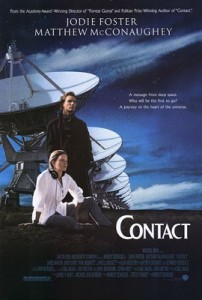One of my mom’s favorite movies is Contact (1997). So I’ve seen it many times. And we’ve discussed it a lot. The movie is an adaptation of a novel by Carl Sagan, known for believing in and researching extraterrestrial life. For Sagan, the idea of aliens replaces the idea of God, in the sense that there is some other benevolent and powerful being out there that is watching us, who cares for us, and will save us.
In the movie, Ellie Arroway, played by Jodie Foster, is a driven, independent young astronomer obsessed with searching for extraterrestrial life. Science is her religion. And according to secular thinking like Ellie’s, if there is no God and therefore the universe came into being without a cause and supports organic life by random chance, then there is no purpose to our existence. We are accidental happenings, not creative designs. We weren’t made for any special purpose. Life has no ultimate meaning, no significance. Experiences in this world that we feel are meaningful are illusions. Any meaning that we have, we have subjectively created for ourselves and these are therefore delusions. There is no objective, non-individualistic or genuine meaning to life. And when we talk about the meaning of life we are talking about what someone intends to express about the sum of life. Does life have meaning for you? Why are we here? What are we here for? Does life signify something for you? Or is it a collection of moments and then you die and that’s it.
I bring this up because in the movie in the second encounter with the has-been priest Palmer Joss, played by Matthew McConaughey, they speak of the meaning of life and why we are here. And the conversation is telling, as to how so many scientists and people in general see the world.
Ellie speaking to Palmer says, “would you like me to quote you? ‘Ironically, the thing that people are most hungry for, meaning, is the one thing that science hasn’t been able to give them.’ Come on, it’s like you’re saying that science killed God. What if science simply revealed that he never existed in the first place.”
A moment later she asks him, “so what’s more likely? That an all-powerful, mysterious God created the universe and then decided not to give any proof of his existence. Or that he simply doesn’t exist at all and that we created him so that we wouldn’t have to feel so small and alone?”
Palmer responds, “I don’t know. I couldn’t imagine living in a world where God didn’t exist. I wouldn’t want to.”
Ellie rejoins, “How do you know you’re not deluding yourself? I mean, for me, I’d need proof.”
Palmer thinks about it for a moment, and then he asks Ellie, “proof… did you love your father?”… “Your dad, did you love him?”
Ellie responds, “Yes, very much.”
Palmer rejoins saying, “Prove it.”
Palmer is getting at the notion that regarding spiritual and heart matters, proving it is not like a lab experiment’s proof. Not only does Ellie have a wrong view of who God is— and therefore would rather believe He doesn’t exist— but she also succumbs to the idea that we are deluding ourselves. In a sense, she realizes that we need meaning in our lives, but she has concluded that we must have created a god to fill the void that needing this meaning creates, instead of realizing that God created this need in us as proof of His existence. Can science give us meaning by revealing that God doesn’t exist?
Toward the end of the movie Contact, when Ellie encounters the alien on the beach he says, “in all our searching the only thing we’ve found that makes the emptiness bearable is each other.” So these aliens are searching for meaning too, huh? Carl Sagan was obsessed with the idea of the existence of extraterrestrial life so he believed—as does the character of Ellie—that aliens will save us. To me it’s as if the movie gets the answer half-right, which makes it such a compelling movie right? Yes, I agree we hunger for meaning and for connections. But instead of seeing a divine fingerprint on this hardwiring, Sagan and those like him, see only matter and energy and human (or alien) potential.
Yet even Sagan creeps into the hopefulness of Christian thinking, because no one can help it really. When Ellie gives her testimony at a hearing about her experience, she speaks of a vision she has had of the universe. She says that in the scope of the universe, we humans are tiny, insignificant, but also rare and precious. That we belong to something greater than ourselves. And she says that we aren’t alone.
I don’t disagree with Ellie’s findings, just why she would believe it. I ask how can we be rare, if there are many other civilizations out there according to Sagan? And who exactly are we precious to?
Secular views state that nothing was intended to be expressed in this universe or in our lives. Man is alone to face permanent extinction. This sort of thinking leads to angst, despair, and dread. So, inevitably those that hold this position waver from it, because we all need hope and meaning in our lives. We can’t live without it. As Yentl sings: “And why have eyes that see and arms that reach / Unless you’re meant to know there’s something more? / If not to hunger for the meaning of it all. / Then tell me what a soul is for?”
All people intuitively sense that their lives have objective and real meaning. The search for meaning and purpose is one of the defining characteristics of the human race. C.S. Lewis’ prime argument against God as an atheist was that the universe seemed so cruel, unjust, futile, and senseless— namely, meaningless. But then Lewis wondered how he had gotten such an idea as just versus unjust. How do we know if a line is crooked, unless we have some idea of what a straight line would be? If your argument against the existence of God hangs on the ideas of justice, goodness, or usefulness, then you are assuming that at least your idea of justice, goodness, and usefulness, this one part of reality, has meaning beyond yourself. But where do these ideas come from? What standard is our measure? “If the whole universe has no meaning, we should never have found out that it has no meaning.” The reason we yearn for ultimate and definitive meaning is because there is an objective ultimate meaning found in God that is outside ourselves, but that is instilled in us by God to point us to Him.
And we don’t just search for meaning within this life, but in life after death as well. The desire for an ultimate meaning of life usually involves a belief in life after death— in which life’s meaningfulness has eternal significance. Man’s unique ability to ponder what the meaning of life is, is a clue that there is meaning to life and meaning beyond this life.
According to Christians, what is the ultimate meaning of life or why are we here, you ask? In the Westminster Shorter Catechism, the first question is: What is the chief end of Man? That is, what is Man’s main purpose? The answer is: Man’s chief end is to glorify God, and enjoy him forever. The Baltimore Catechism answers the question “Why did God make you?” by saying “God made me to know Him, to love Him, and to serve Him in this world, and to be happy with Him forever in heaven.” Now, I think there are a lot of ways to carry out this purpose. The main point is to know that you were made for God by God and that gives your life meaning and purpose. Only God makes sense of the meaning that humans sense and yearn for.

